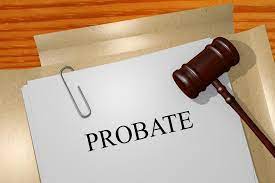If someone dies, their estate needs to be administered through probate before it is passed on to the heirs. Probate is a legal process to transfer the assets of a person following their death. It is a lengthy and expensive procedure, and many people attempt to avoid it whenever they are able to.
There are several methods to stay clear of probate. One option is to establish the living trust. Another option is to transfer the ownership of the property to another when you die. However, even if you do those steps, probate could still be required in certain instances.
Probate Is Required When:
* The deceased owned properties in their own name The deceased was a debtor who needed to be paid off The estate is huge and complicated * There are disputes among the heirs regarding who should be the heirs to the assets of the deceased
Steps To Avoid Probate
There are many ways to prevent probate. The first step is to be aware of probate and how it operates. Probate is the legal procedure that allows the property of a deceased individual is distributed to the heirs of the deceased. The court supervises all distributions of property and also the payment of debts through the estate.
Probate is a lengthy and costly procedure, which is why avoidance is usually in the best interests of the inheritors.
There are a number of important ways to accomplish this:
1. Transfer the ownership of the assets in trust This is possible in your lifetime or after your death. This will make sure that the assets you own are divided in accordance with your wishes without having to go through probate.
2. Create beneficiary designations on all insurance policies and accounts: By doing this you will be able to ensure that the assets be handed directly to your named beneficiaries at the time of your death, and without having to go through probate.
3. Jointly hold property a third party: This includes joint tenantship with the right of survivorship, or community property that has survivor’s rights. In either case the owner who survives will be the owner of the property and without needing to go through probate.
4. Gifts you can give during your life time: You can give gifts of up to $14,000 per year per recipient , without having to pay any tax obligation for gifts (this amount can alter in the coming years). The gifts you give will not be considered probate-worthy because they aren’t
Questions About Probate
If you’re like many people, you’re likely to have lots of questions about probate. What exactly is probate? How do you use it? What are the advantages of not having probate?
Let’s begin by defining Probate is the legal procedure of dispersing assets belonging to a person following their die. The court names an executor who oversees the process and ensure that debts are paid as well as assets are distributed in accordance with the wishes of the deceased.
There Are A Few Good Reasons To Avoid Probate:
1. By avoiding probate, you can reduce the time spent by your family and money. Probate is costly and time-consuming So avoiding it could save your loved ones from some stress.
2. Probate can be a publicly accessible procedure. This means that the information about your decedent’s estate be public records. If you’d like the details of your life to be kept in the privacy of your home by avoiding probate, it is an excellent option to accomplish this.
3. In certain cases the probate process may be challenged by creditors or family members and can delay the process of distributing your assets and cause anxiety for your loved ones. Preventing probate may help to keep these disputes from occurring from the beginning.
Conclusion
We hope this article provided you with a few excellent reasons to stay clear of probate. Probate is a time-consuming and expensive procedure however it’s rarely needed. If you’re unsure the need to or whether you should make a will probateable, speak with an experienced lawyer who can help you comprehend the advantages and disadvantages of probate for your particular circumstance.
About Author
Jim Turner is a USA-based author of legal questions related to the estate plan, wills & trust, corporate law as well as elder law. Jim Turner does his best writing about these topics. He published his Last Will and Testament Michigan that helps readers find the best answers to their questions about Estate planning probate living trusts, probate process and other legal issues pertaining to family law.















